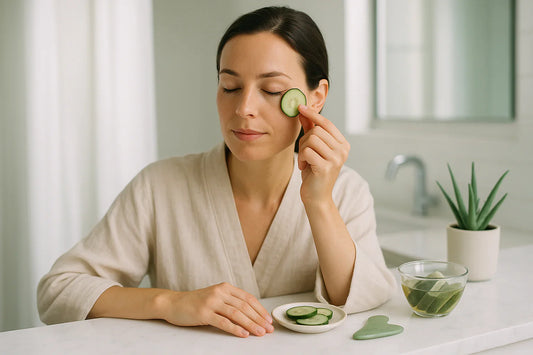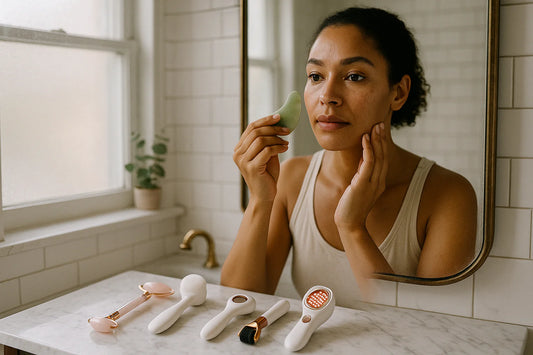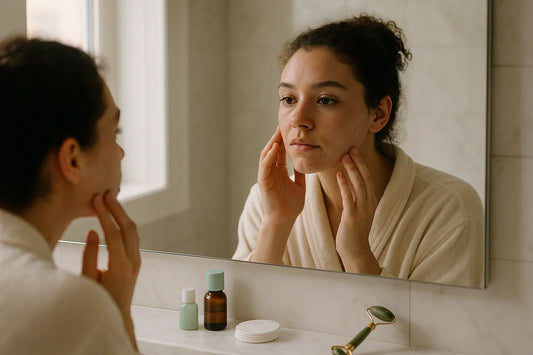Get your package anywhere!

Complete Guide: Healthy Scalp Care for Maximum Hair Growth
Did you know that 95% of hair growth problems start with scalp health issues? A healthy scalp is the foundation for strong, vibrant hair, yet most people focus only on their hair strands. Whether you're dealing with thinning hair, slow growth, or scalp irritation, this comprehensive guide reveals the science-backed methods to transform your scalp health and unlock your hair's full potential.
Table of Contents
- Understanding Your Scalp: The Foundation of Hair Growth
- Essential Daily Scalp Care Routine
- Proven Natural Remedies for Scalp Health
- Nutrition and Lifestyle for Optimal Scalp Health
- Professional Treatments and Advanced Solutions
- Myths & Facts About Scalp Care
- FAQ
Understanding Your Scalp: The Foundation of Hair Growth
Your scalp ecosystem is more complex than you might think. It contains approximately 100,000 hair follicles, sebaceous glands, and a delicate microbiome that directly impacts hair growth. When this environment is balanced, your hair thrives. When disrupted, you may experience hair thinning, slow growth, or scalp conditions.
Common scalp issues include:
- Seborrheic dermatitis: Causes flaking and inflammation
- Dry scalp: Leads to itching and brittle hair
- Oily scalp: Can clog follicles and slow growth
- Product buildup: Creates a barrier preventing healthy growth
The key is understanding your scalp type and its specific needs. A balanced scalp produces the right amount of sebum (natural oil) to protect and nourish hair follicles while maintaining optimal pH levels between 4.5-5.5.
"A healthy scalp has adequate blood circulation, balanced oil production, and minimal inflammation. When we address these three factors, we typically see 30-40% improvement in hair growth within 8-12 weeks."
| Scalp Type | Characteristics | Main Concerns |
|---|---|---|
| Normal | Balanced oil, no irritation | Maintenance only |
| Dry | Flaking, tightness, itching | Hydration, gentle care |
| Oily | Greasy feel, frequent washing needed | Deep cleansing, balance |
| Sensitive | Redness, burning, reactions | Gentle products only |
Essential Daily Scalp Care Routine
Creating an effective scalp care routine doesn't require dozens of products. Focus on these fundamental steps:
Daily Care (2-3 minutes):
- Gentle massage: Use fingertips to massage scalp for 2-3 minutes, increasing blood flow
- Brush properly: Use a wide-tooth comb or natural bristle brush, starting from ends
- Protect from environment: Shield from harsh sun, wind, and pollution
Weekly Deep Care (15-20 minutes):
- Clarifying wash: Remove product buildup with a gentle clarifying shampoo
- Scalp exfoliation: Use a soft brush or specialized scalp scrub
- Nourishing treatment: Apply scalp-specific serums or oils
Proper washing technique is crucial. Use lukewarm water, focus shampoo on the scalp (not hair lengths), and massage gently with fingertips—never nails. Rinse thoroughly to prevent residue buildup.
Proven Natural Remedies for Scalp Health
Natural ingredients can be surprisingly effective for scalp health. Here are science-backed options:
Essential Oil Treatments:
- Rosemary oil: Clinical studies show it's as effective as 2% minoxidil for hair growth
- Peppermint oil: Increases blood circulation and follicle depth
- Tea tree oil: Antifungal properties help with dandruff and scalp irritation
- Lavender oil: Reduces inflammation and promotes relaxation
DIY Scalp Treatments:
- Apple cider vinegar rinse: Mix 1:3 with water to balance pH and remove buildup
- Green tea rinse: Rich in antioxidants that support follicle health
- Aloe vera gel: Soothes irritation and provides hydration
- Coconut oil mask: Deep conditioning for dry, flaky scalps
Always dilute essential oils with a carrier oil (jojoba, argan, or coconut) before applying to your scalp. Start with a 2% dilution (about 12 drops per ounce of carrier oil) and patch test first.
"After struggling with a dry, itchy scalp for years, I started using rosemary oil massages three times a week along with my HighWand device. Within 6 weeks, my scalp felt healthier and my hair looked noticeably fuller!"
— Sarah M., HighWand Customer
Nutrition and Lifestyle for Optimal Scalp Health
Your scalp health reflects your overall wellness. These nutritional factors directly impact your scalp and hair:
Essential Nutrients:
- Omega-3 fatty acids: Found in salmon, walnuts, and flaxseeds—reduce inflammation
- Biotin and B-vitamins: Support keratin production and cell renewal
- Iron and zinc: Deficiencies can cause hair loss and scalp issues
- Vitamin D: Essential for follicle health and hair cycle regulation
- Protein: Hair is 95% protein—aim for 0.8g per kg of body weight daily
Lifestyle Factors:
- Stress management: Chronic stress increases cortisol, which can disrupt hair growth
- Quality sleep: Hair grows most during deep sleep phases (7-9 hours nightly)
- Regular exercise: Improves circulation and reduces inflammation
- Hydration: Drink 8-10 glasses of water daily for optimal scalp moisture
| Food | Key Nutrients | Scalp Benefits |
|---|---|---|
| Salmon | Omega-3, Protein, Vitamin D | Reduces inflammation |
| Spinach | Iron, Folate, Vitamin A | Supports circulation |
| Sweet Potatoes | Beta-carotene, Vitamin C | Antioxidant protection |
| Greek Yogurt | Protein, Probiotics, B5 | Strengthens follicles |
Professional Treatments and Advanced Solutions
When home care isn't enough, professional treatments can provide more intensive results:
In-Office Treatments:
- Scalp micropigmentation: Creates appearance of fuller hair
- PRP (Platelet-Rich Plasma): Uses your blood's growth factors to stimulate follicles
- Low-level laser therapy: FDA-approved for hair growth stimulation
- Scalp facials: Deep cleansing and nourishing professional treatments
At-Home Professional-Grade Options:
Advanced devices like the HighWand HairBoost™ use high-frequency technology to stimulate blood circulation, reduce inflammation, and promote healthier hair growth—all from the comfort of your home.
When to Seek Professional Help:
- Sudden or excessive hair loss
- Persistent scalp irritation or infection
- No improvement after 3 months of consistent care
- Bald patches or unusual hair loss patterns
Myths & Facts About Scalp Care
-
Myth: Frequent washing causes hair loss.
Fact: Clean scalps promote healthy growth; you're just seeing natural shedding (50-100 hairs daily is normal). -
Myth: Brushing 100 strokes daily improves hair growth.
Fact: Excessive brushing can cause breakage; gentle massage is more effective for circulation. -
Myth: Natural ingredients are always gentle and safe.
Fact: Some natural ingredients can cause allergic reactions; always patch test first. -
Myth: Cutting hair makes it grow faster.
Fact: Hair growth happens at the scalp level; trimming only affects length and health of existing hair.
FAQ
How often should I wash my hair for optimal scalp health?
Most people benefit from washing 2-3 times per week. Oily scalps may need daily washing, while dry scalps should limit washing to prevent stripping natural oils.
Can scalp massage really promote hair growth?
Yes! Studies show daily 4-minute scalp massages can increase hair thickness after 24 weeks by improving blood circulation and reducing scalp tension.
What's the difference between dry scalp and dandruff?
Dry scalp produces small, white flakes and feels tight. Dandruff causes larger, yellowish flakes with oiliness and is often caused by fungal overgrowth.
How long does it take to see results from scalp care?
Initial improvements in scalp comfort appear within 2-4 weeks. Hair growth changes typically become visible after 8-12 weeks of consistent care.
Are expensive scalp treatments worth the investment?
Results vary by individual and condition severity. Start with consistent home care and natural remedies before investing in costly professional treatments.
Can stress really affect my scalp and hair health?
Absolutely. Chronic stress can trigger telogen effluvium (temporary hair loss), worsen scalp conditions, and disrupt the hair growth cycle.
Conclusion
Achieving a healthy scalp and optimal hair growth requires a holistic approach combining proper cleansing, targeted treatments, good nutrition, and consistency. Whether you choose natural remedies, professional treatments, or innovative devices like the HighWand hair growth collection, the key is understanding your scalp's unique needs and maintaining a routine. For additional guidance, consult resources like the American Academy of Dermatology or speak with a qualified trichologist.

More skincare tips
View all-

Natural Remedies to Minimize Puffiness Around t...
Over 70% of adults deal with eye puffiness, often making them look tired even after a full night’s sleep. Whether from allergies, habits, or genetics, natural remedies like cold therapy,...
Natural Remedies to Minimize Puffiness Around t...
Over 70% of adults deal with eye puffiness, often making them look tired even after a full night’s sleep. Whether from allergies, habits, or genetics, natural remedies like cold therapy,...
-

Choosing the Right Skincare Tool for Your Skin ...
Skincare tools in 2025 can be overwhelming—and 73% of beauty lovers admit they’re confused about what really works. The wrong pick can waste money and irritate skin, while the right...
Choosing the Right Skincare Tool for Your Skin ...
Skincare tools in 2025 can be overwhelming—and 73% of beauty lovers admit they’re confused about what really works. The wrong pick can waste money and irritate skin, while the right...
-

Why Does One Side of My Face Have More Acne? 7 ...
Asymmetrical acne—when one side of your face breaks out more than the other—affects most acne-prone people. Hidden triggers like sleep position, phone use, or hair products often fuel the imbalance....
Why Does One Side of My Face Have More Acne? 7 ...
Asymmetrical acne—when one side of your face breaks out more than the other—affects most acne-prone people. Hidden triggers like sleep position, phone use, or hair products often fuel the imbalance....
Satisfied or refunded
Free returns within 60 days
We are available 24/7
Contact us by chat, mail, phone
100% Secure payments
Visa, Mastercard, Amex, PayPal
We deliver worldwide
Get your package anywhere!
Satisfied or refunded
Free returns within 60 days
We are available 24/7
Contact us by chat, mail, phone
100% Secure payments
Visa, Mastercard, Amex, PayPal
- Choosing a selection results in a full page refresh.
- Opens in a new window.




